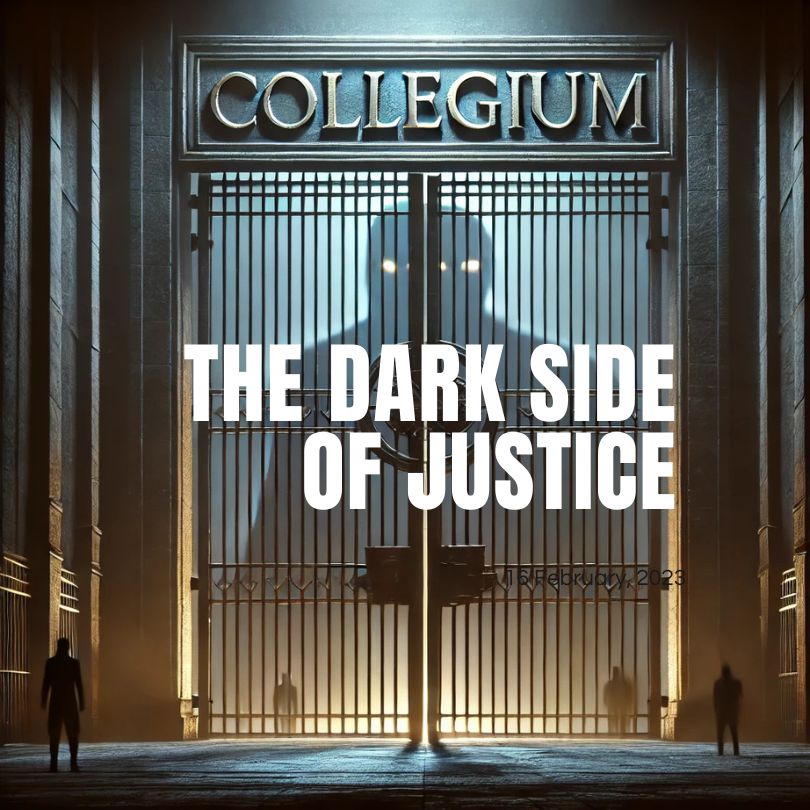India's Judiciary Under Siege: The Shocking Truth About the Collegium System!

This closed-door process has come under fire for its opacity, lack of accountability, and alleged elitism, raising serious questions about the credibility of judicial appointments. With growing calls for reform and rising tensions between the government and the judiciary, the debate over the Collegium’s relevance has reached a boiling point.
But is the demand for transparency justified, or does it threaten judicial independence? Let’s dive deep into the controversies, expert opinions, and the future implications of India’s most secretive judicial system.
⚖️ A Closed Door to Power?
The Collegium system was established to protect the judiciary’s independence from political interference. However, over the years, it has morphed into a power center with no oversight, sparking allegations of favoritism and nepotism.
Critics argue that secrecy breeds corruption. When judicial appointments lack transparency, it creates an environment where favoritism and bias can flourish. With no formal guidelines or disclosures, the public is left in the dark about how judges are chosen.
However, defenders of the system claim that executive involvement could jeopardize judicial autonomy, leading to political interference. They argue that independence from political pressure is essential to safeguard judicial impartiality.
✅ The Big Question: Should the judiciary’s independence come at the cost of public accountability?

Battle of Independence vs. Accountability
Prominent legal experts and retired judges have voiced concerns over the Collegium’s lack of accountability:
➡️ Justice J. Chelameswar, a former Supreme Court judge, once described the Collegium as a “you-scratch-my-back-I-scratch-yours” club, criticizing its opaque nature.
➡️ Senior Advocate Dushyant Dave called for greater transparency in the appointment process, emphasizing that “a judiciary that lacks public confidence is no judiciary at all.”
➡️ On the other hand, Justice Rohinton Nariman defended the Collegium, arguing that government interference would threaten judicial independence and weaken the separation of powers.
What’s at Stake?
If the Collegium system continues unchecked:
- Judicial Credibility Will Erode: Public trust in the judiciary will decline if appointments appear biased or influenced by personal connections.
- Backlog of Cases Will Grow: Delays in appointments will worsen India’s massive 4.4 crore pending cases, further slowing down justice.
- Executive-Judiciary Clash Will Intensify: Tensions between the government and the judiciary could lead to frequent constitutional crises.
- Public Confidence May Collapse: If judicial independence is viewed as a cover for opacity, citizens may lose faith in the judicial system altogether.
Why This Matters
The Collegium system impacts every Indian citizen. When judicial appointments are delayed or influenced by favoritism, it directly affects the efficiency and fairness of the justice system.
Example: The prolonged vacancies in the judiciary have crippled court efficiency, with cases dragging on for decades. A lack of diversity among judges could lead to biased rulings, marginalizing vulnerable groups.
How It Impacts You (The Public & Legal Professionals)
For the general public:
- Delayed Justice: Prolonged vacancies mean your case could take years or even decades to get a verdict.
- Reduced Trust in Judiciary: Lack of transparency erodes public confidence in the legal system.
- Elitism Concerns: If the judiciary favors only privileged candidates, marginalized voices may go unheard.
For legal professionals:
- Limited Career Opportunities: A closed and opaque selection process could limit opportunities for deserving but lesser-known legal professionals.
- Judicial Friction: Frequent government-judiciary clashes may affect legal reforms and judicial efficiency.
- Uncertain Legal Landscape: Delayed appointments could slow down landmark case decisions and legal reforms.
Visual & Cultural Relevance
To make this debate relatable, consider this analogy:
Imagine if your company’s top promotions were decided by a secret committee of managers, with no criteria or explanations. Would you trust the process or suspect favoritism and hidden agendas? The Collegium system, in many ways, resembles this opaque power structure.
Conclusion
The Collegium system, once designed to protect judicial independence, now stands at a crossroads. Its lack of transparency, accountability issues, and alleged elitism have put its credibility under the spotlight.
While judicial independence is vital, complete secrecy undermines public trust. The demand for reforms—including greater transparency, the inclusion of diverse voices, and defined selection criteria—is growing louder.
What’s Your Take?
Should India continue with the opaque Collegium system, or is it time for a transparent, accountable hybrid model?
If you found this insightful, hit SHARE and let others join the debate! Let’s spark a meaningful conversation on judicial accountability.⚖️
- Innovate(5)
- Bharat(13)
- Life Hacks(1)
- Global(15)
- Reviews(1)



